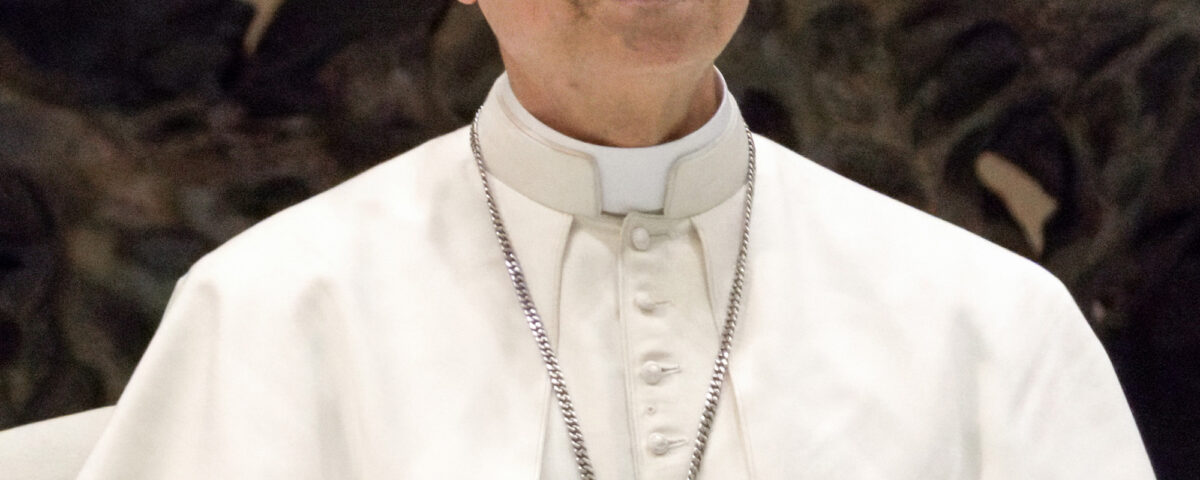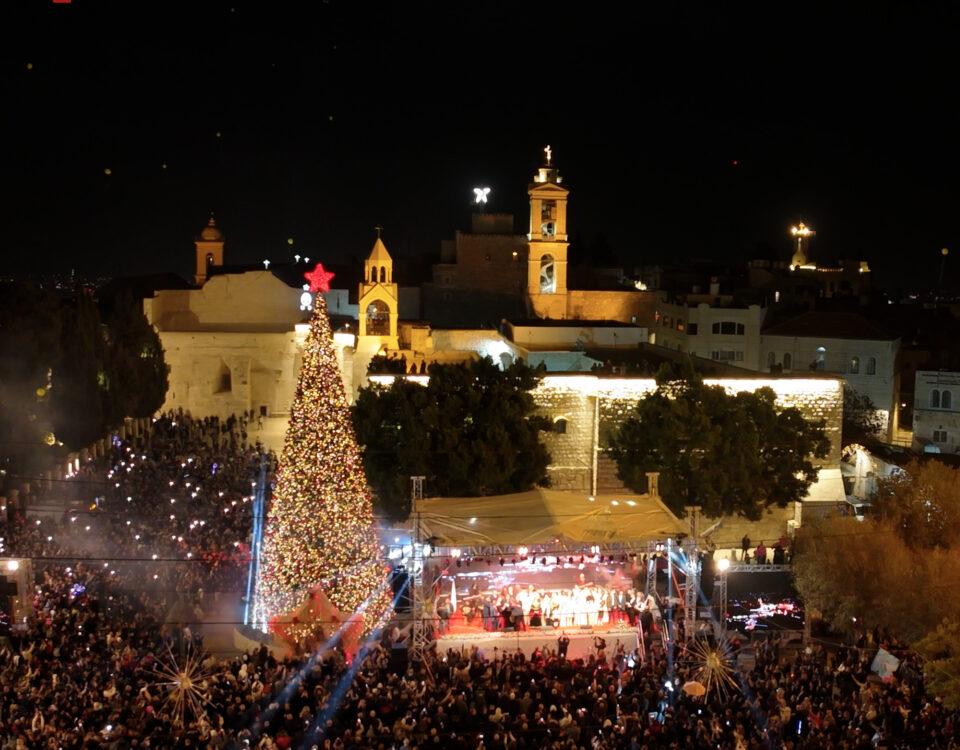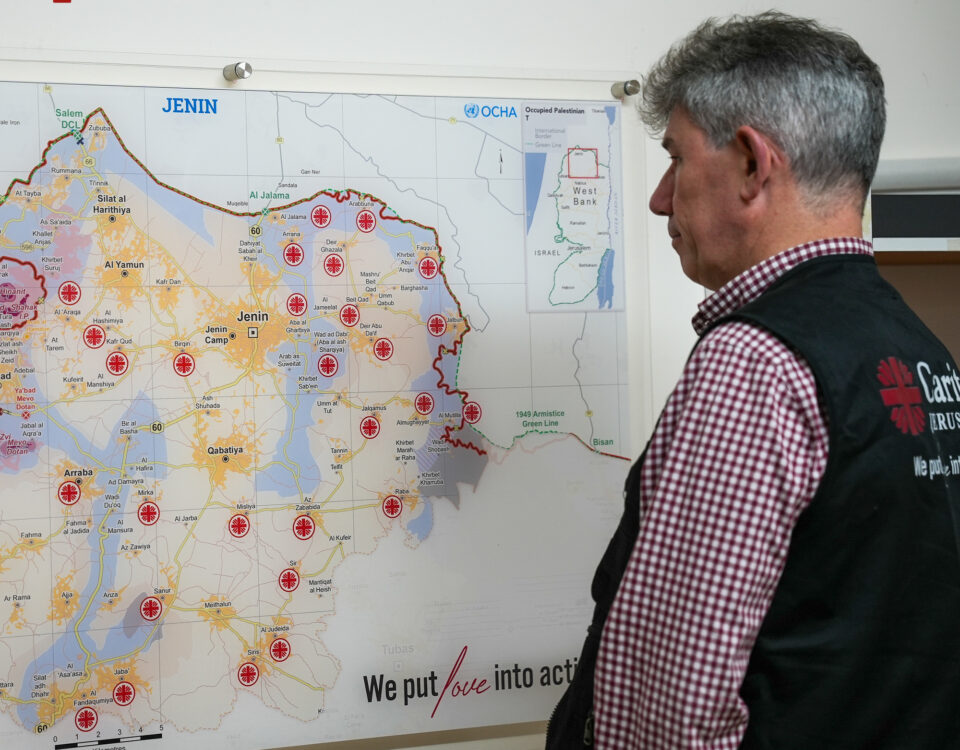
Caritas Jerusalem Delivers 10,000 Cans of Infant Formula to Gaza Following End of the War
October 14, 2025
THE INAUGURATION OF THE VEHICLE OF HOPE
November 27, 2025Caritas Internationalis warmly welcomes the Holy Father’s Exhortation Dilexi Te and is humbled by his recognition of the Confederation’s mission to serve people in
need wherever they may be — in wealthy societies where many are overlooked, and in areas where communities face deep challenges, climate change, and
conflicts, and as a result, sometimes are forcibly displaced.
Pope Leo invites us to show “love for the poor” and more generally to our brothers and sisters in need because this is at the core of what it means to be a Christian.
The Church’s tradition of working for and with migrants continues, and today this service is expressed in initiatives such as refugee reception centres, border
missions and the efforts of Caritas Internationalis and other institutions.
Pope Leo, Dilexi te, 75
This important acknowledgment from the Holy Father is a powerful encouragement for Caritas Internationalis to continue its mission with renewed commitment to
bringing hope, dignity, and concrete expressions of God’s love to those most affected by injustice and hardship.
The Pope’s message, set out in Dilexi Te, which literally means “I have loved you” in Latin, calls for people to show love to those living in poverty through practical
action and by addressing the injustices and inequalities that drive poverty in the modern world.
This first major teaching document of his papacy, he explains how Jesus not only served those living in poverty but showed God’s love for people on the margins of
society by being born into poverty himself as “the poor Messiah”.
Love for the poor is an essential element of the history of God’s dealings with us; it rises up from the heart of the Church as a constant appeal to the hearts
of the faithful, both individually and in our communities.
Pope Leo, Dilexi te, 103
The call from the Holy Father comes in a document known as an ‘apostolic exhortation’, one of the most important types of teaching document a pope can issue.
Pope Leo explains that he is sharing the exhortation at the start of his pontificate to demonstrate it is “essential to insist” that “all Christians come to appreciate the
close connection between Christ’s love and his summons to care for the poor.”
Love for the poor is not an “add-on” to Christianity, according to the Pope, but has “been a central part” of the Church’s life throughout its history. As well as
showing how central service to the poor was in Jesus’s ministry, Pope Leo cites the examples of countless saints who dedicated their lives to caring for those living
in poverty – including St Francis, St Clare and St Teresa of Calcutta.
Poverty exists in different ways in modern world
Pope Leo goes on to warn that people are experiencing different kinds of poverty in the modern world. Many communities are still living without access to basic
needs, such as food and water. Families in other communities, including in Europe, “find themselves unable to make it to the end of the month”.
While significant changes are under way in some countries, “the organization of societies worldwide is still far from reflecting clearly that women possess the
same dignity and identical rights as men. We say one thing with our words, but our decisions and reality tell another story,” especially if we consider the
numbers of women who are in fact destitute.
Pope Leo, Dilexi te, 12
Poverty of women and migrants
He laments the “exclusion, mistreatment and violence” that many women face, arguing that “the organisation of societies worldwide is still far from reflecting clearly
that women possess the same dignity and identical rights as men.” Pope Leo also speaks about the contribution women have played in caring for the poor
throughout Church history, especially the service given by female Religious orders over centuries.
Pope Leo is unequivocal in stating that Christians are called to accompany people who are migrating from one country to another. The Holy Father again sets out
the Biblical tradition underlining this obligation, explaining how the experience of migration “accompanies the history of the People of God” – from Abraham setting
out for a new land, to Moses leading his people through the desert, right through to the Holy Family fleeing to Egypt. Pope Leo presents the service of St Frances
Xavier Cabrini, an Italian nun who became the first saint from the Pope’s homeland, the United States of America, and who dedicated her life to starting “schools,
hospitals and orphanages” for poor migrants “who ventured into the new world in search of work”.
The work of organisations such as Caritas Internationalis is cited as an example of how Christians can work to “welcome, protect, promote and integrate” migrants
and refugees.
How we can respond to the Pope’s call in Dilexi te
As well as observing the situations people living in poverty face, Pope Leo urges us to support people as they experience these situations, and to solve the root
causes of poverty, reminding that welfare projects, which meet certain urgent needs, should be considered merely provisional responses (#94), a principle that lies
at the heart of Caritas’ mission.
The Pope highlights and even defends the importance of providing practical support to people in poverty through almsgiving. The Holy Father says the “most
important way to help the disadvantaged is to assist them in finding a good job, so that they can lead a more dignified life by developing their abilities and
contributing their fair share”.
But we “cannot risk abandoning” those who cannot work “to the fate of lacking necessities for a dignified life”, meaning that “almsgiving remains, for the time being,
a necessary means of contact, encounter and empathy with those less fortunate”.
Yet focusing on the importance of showing charity to our sisters and brothers does not “eliminate the duty of government institutions to care for the poor or detract
from rightful efforts to ensure justice”.
Like his predecessors Pope Francis and Pope Benedict XVI, Pope Leo calls for reforms to the systems that trap people in poverty, urging leaders to work to create
“economic institutions capable of guaranteeing regular access to sufficient food and water”, and ending economic inequalities that allow a minority of people “to
consume in a way which can never be universalized, since the planet could not even contain the waste products of such consumption”.
Veuillez trouver ci-joint la traduction en français.
Adjunto encontrarán la traducción al español.
Church’s mission





